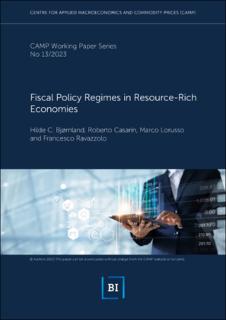| dc.contributor.author | Bjørnland, Hilde C. | |
| dc.contributor.author | Casarin, Roberto | |
| dc.contributor.author | Lorusso, Marco | |
| dc.contributor.author | Ravazzolo, Francesco | |
| dc.date.accessioned | 2023-10-23T16:14:53Z | |
| dc.date.available | 2023-10-23T16:14:53Z | |
| dc.date.issued | 2023-10-21 | |
| dc.identifier.issn | 1892-2198 | |
| dc.identifier.uri | https://hdl.handle.net/11250/3098196 | |
| dc.description.abstract | We analyse fiscal policy in resource-rich economies using a novel Bayesian regime-switching panel model. The identified regimes capture pro- or countercyclical fiscal behaviour, while the switches between the regimes have the interpretation of changes in fiscal policy. Applying the model to sixteen oil-producing economies, we show that fiscal policy has alternated between a procyclical and countercyclical regime multiple times over the sample. Furthermore, we find fiscal policy to be more volatile in the procyclical regime and that the probability of being in the procyclical regime is higher for OPEC countries rather than non-OPEC countries. We also show that following either an increase or decrease in oil revenues, the growth in government expenditure mostly increases, suggesting there is an upward bias in expenditures in oil-producing countries. These are new findings in the literature. | en_US |
| dc.language.iso | eng | en_US |
| dc.publisher | BI Norwegian Business School | en_US |
| dc.relation.ispartofseries | CAMP Working Paper Series;13/2023 | |
| dc.subject | Dynamic Panel Model | en_US |
| dc.subject | Markov Switching | en_US |
| dc.subject | Bayesian Inference | en_US |
| dc.subject | Fiscal Policy | en_US |
| dc.subject | Oil-Rich Countries | en_US |
| dc.subject | Oil Prices | en_US |
| dc.title | Fiscal Policy Regimes in Resource-Rich Economies | en_US |
| dc.type | Working paper | en_US |
| dc.source.pagenumber | 42 | en_US |
